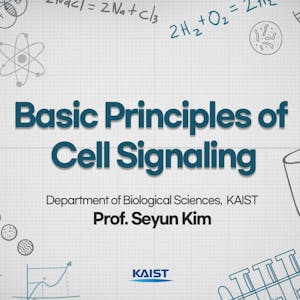Basic Principles of Cell Signaling
The coordination of life in multicellular organisms is precisely controlled by cells via various internal and external signals. Cells depend on different types of signals to regulate their growth, division, metabolism as well as death. Signals are growth factors or hormones produced and secreted by other cells. Some signals such as nutrients are in the form of molecules from the environment. Signaling molecules are sensed by direct binding to specific receptor molecules. Depending on the biochemical properties and ways of molecules changes, we can group various signaling events in defined pathways. Throughout specific signal transduction pathways, a signal can modulate cellular activities and gene expression, thereby leading to changes in cell growth, metabolism, differentiation, or many other cellular functions. When genetic mutations or biochemical changes occur in key proteins of certain cellular signaling pathways, cellular homeostasis can be disrupted, thus triggering tissue malfunctions, itiation or spread of cancer, or developmental anomalies. Dissecting biochemical principles of these cell signaling pathways is essential for us to better understand mechanisms of both normal cells and pathological conditions, therefore our knowledge on signal transduction will provide valuable information to develop effective therapeutic agents to fight against diseases..This 6 week-course will give you a solid introduction to the basic fundamentals of cell signaling. I will first define the concept of cell signaling and introduces major types of cellular signaling events. Throughout 6 weeks, we will study biochemical basis of electrical signaling, chemical signaling as well as gap junction-mediated signaling pathways. We will also learn about key principles underlying signal transduction pathways by studying significance of protein-protein interactions and signaling second messengers. In the end of each week, dysregulated cell signaling in pathological conditions such as cancer and diabetes will be presented and discussed. Everyone knows that cell signaling is essential for sustaining life. How can you explain insulin actions in lowering glucose in biochemical details? What can be the fundamental mode of oxygen sensing in our body? Have you ever thought about ways of how we can specifically remove or kill certain types of rapidly-growing cancer cells? Cell signaling accompanies various biochemical strategies to sense and transmit signals inside our cells. Without fine control of those signaling processes, cells, tissues, and organisms cannot maintain life.
None
Syllabus
Syllabus - What you will learn from this course
Week 1
Module 1 : Introduction of Cell Signaling & Electrical Signaling
Week 2
Module 2: Receptor tyrosine kinase signaling
Week 3
Module 3: Receptor serine/threonine kinase signaling
Week 4
Module 4: G protein coupled receptor signaling
Week 5
Module 5: Other cell signaling pathways
Week 6
Module 6: Sensing internal and external conditions
Week 7
Final exam
FAQ
When will I have access to the lectures and assignments?
Access to lectures and assignments depends on your type of enrollment. If you take a course in audit mode, you will be able to see most course materials for free. To access graded assignments and to earn a Certificate, you will need to purchase the Certificate experience, during or after your audit. If you don't see the audit option:
The course may not offer an audit option. You can try a Free Trial instead, or apply for Financial Aid.
The course may offer 'Full Course, No Certificate' instead. This option lets you see all course materials, submit required assessments, and get a final grade. This also means that you will not be able to purchase a Certificate experience.
What will I get if I purchase the Certificate?
When you purchase a Certificate you get access to all course materials, including graded assignments. Upon completing the course, your electronic Certificate will be added to your Accomplishments page - from there, you can print your Certificate or add it to your LinkedIn profile. If you only want to read and view the course content, you can audit the course for free.
Is financial aid available?
Yes. In select learning programs, you can apply for financial aid or a scholarship if you can’t afford the enrollment fee. If fin aid or scholarship is available for your learning program selection, you’ll find a link to apply on the description page.
Reviews
I am very thanful for all those who provide us this amzing learning plateform. I have learnt more than my expectations.
the course provided a very useul and a huge amount of knowledge! grateful for the this opportunity to take this course!
An exceptional course with remarkable slides. It is very understandable.
The course was informative and helped me grow my skills and helped me develop my knowledge base.
